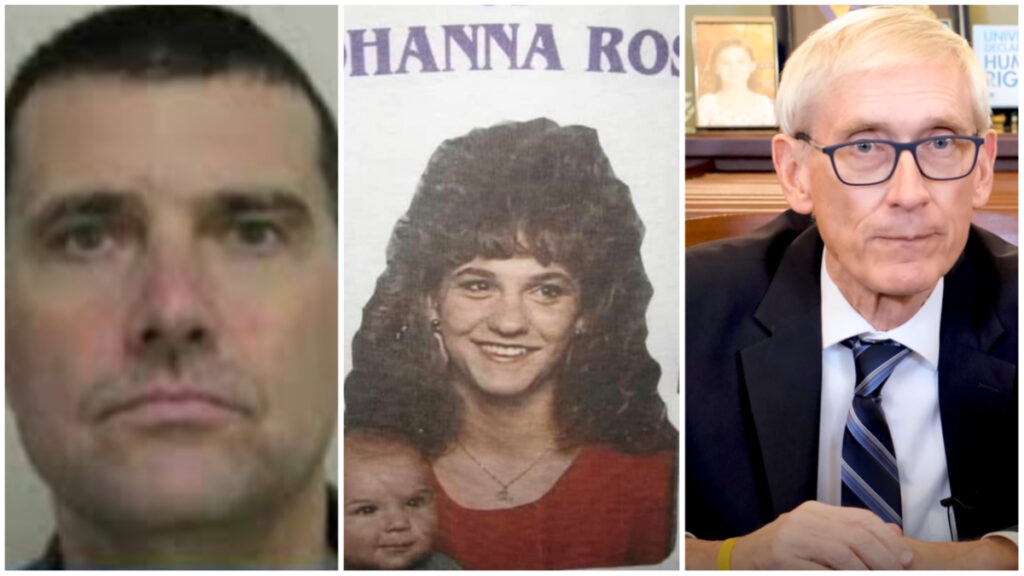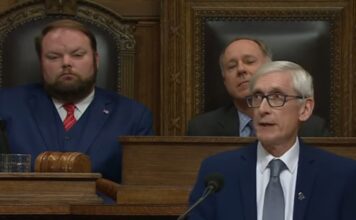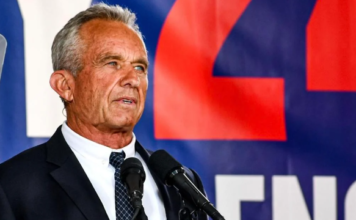John Tate, Tony Evers’ two-time appointee to the Wisconsin Parole Commission, testified that the governor pushed for his resignation last spring because he didn’t want to give the Republican-controlled Legislature the opportunity to re-litigate parole cases in public.
Tate said he didn’t resign because of the case of wife killer Douglas Balsewicz, whose parole he granted before rescinding it at Evers’ request after public outcry erupted.
“I was asked to resign in anticipation of the upcoming Legislature going into a special session and litigating parole cases or re-litigating parole cases in the public sphere and at the end of that process rejecting my confirmation,” Tate revealed during August testimony at Balsewicz’s appeal hearing.
Read the transcript here.
“Oh, so the Legislature was going to take special action against you in light of that?” Balsewicz’s attorney Tony Cotton asked.
“That was what was anticipated by the administration,” Tate said.
“That was concern that he had?” asked Cotton.

“Yes.”
“The (governor’s) staffers when they indicated Evers’ displeasure with this decision, they had indicated to you that this is a politically difficult situation for him because you’ve granted parole to a convicted murderer. Haven’t they communicated that to you?” Cotton pressed on.
“…They’ve granted parole to a lot of people, but there is displeasure about this particular case,” Tate said.
“Right. And this one got into the news, didn’t it?” Cotton asked.
“Yes,” Tate said. Tate said he was contacted by a “bunch of reporters” and confirmed he told a Milwaukee Journal Sentinel reporter there was no basis to rescind the parole.
Criticism “falls on your shoulders but it also falls on the governor’s shoulders because you’re a political appointee. Fair to say?” Cotton asked.
“Yes,” Tate responded.
We’ve since unearthed a series of other discretionary paroles by Tate of killers as brutal as Balsewicz. Evers has been silent on those specific cases. Many of the victims’ families say they were never notified of the parole hearings and/or paroles.
Tate also testified that he expanded his own powers as chair. Tate said he changed the process during his tenure “where every recommendation was being finalized by me. But prior to that, only recommendations for deferral or either over 12 months for grants were going to the chair.”
Tate rescinded the Balsewicz parole after Evers belatedly asked him to do so, following massive pressure from the victim’s family. He then resigned upon Evers’ request a short time later. The administrative law judge who presided over the appeal hearing is recommending that Evers’ new appointee, Chris Blythe, keep Balsewicz in prison because the victim’s daughter, Nikkole Nelson, was not notified of the parole hearing.
Tate confirmed he was named chair of the Parole Commission in June 2019 by Evers. He was appointed by the governor and never confirmed by Republicans in the state Senate, so he remained an acting chairman. He was reappointed in 2021 by Evers, after he had already released many other killers and rapists in discretionary paroles.
Tate said parole hearings are held by commissioners who make a recommendation to the chair, who has the final say. “Victims have a right to participate in those hearings,” he said.

He said the decision to grant parole is discretionary on the part of the chair.
The notices on parole hearings are sent by the Department of Corrections’ Office of Victim Services, he said. DOC is a state agency under Evers’ authority that is led by a cabinet appointee of the governor.
The notice of parole decisions comes from the Parole Commission, Tate said. A victim notification database used to provide victims’ notification is run by the DOC Office of Victim Services, he said.
Tate confirmed he granted parole for wife killer Douglas Balsewicz after commissioner Jennifer Kramer recommended it.
Tate said he rescinded the parole after it was brought to his attention that “really one victim, in particular, had not been offered the right or offered the ability to express their right or exercise their right to participate in the parole process.”
Tate said this failure occurred because of the “effective gaps that exist within the registration process,” because the victim’s daughter was a minor when people were informed of the system for notification.
He noted that victims have a “statutory right, Constitutional right” to participate in the parole process.
Tate admitted he had conversations with Evers’ staff informing him that “the governor was going to ask for me to rescind the parole grant.”
Balsewicz received an 80-year sentence, so he was eligible for parole at year 20. However, he had been denied parole multiple times before. He stabbed his estranged wife Johanna 42 times as she lay in bed with their daughter and then left the couple’s two children with their mother’s body.
Tate admitted Balsewicz’s parole was a subjective determination.
Balsewicz completed all of his programming “many years ago,” Tate’s attorney said.
Tate said that he felt Balsewicz had served sufficient time in prison, almost 25 years of the 80-year sentence.
Tate said he did not believe there was a lack of transparency in the parole process.
He said he had multiple conversations with Evers’ staff. Tate believed there was a notification breakdown. “The administrative processes that would ensure notification for certain parties did not exist,” he said. “The system at the time is responsible.”
Elizabeth Lucas, the director of the Department of Corrections Office of Victim Services and Programs, also testified.
They are an office of eight people and provide services to victims of crime. “We provide them with notifications pertaining to their rights as crime victims,” Lucas testified.
Victims have a right “afforded to them by law” to participate in the parole process, she said.
“The victims have the opportunity to participate in the parole process if they are enrolled with the office of victim services and programs,” Lucas testified. She said victims can enroll through a local DA’s office at the time of the criminal case or by calling her office afterward.
Marsy’s law and Chapter 950 of the Wisconsin statutes both give victims a right to participate.
They are entitled to receive notice of upcoming parole hearings and decisions if they are enrolled, she testified.
Her office sends notices of upcoming parole hearings. If the parole outcome is a deferral, her office sends that notice too. If parole is granted, that notification comes from the Parole Commission, she said.
Her office keeps track of the enrollments.
There is no mechanism to enroll minor victims, she said, or to tell them about the system once they reach age 18.
Cotton emphasized that the parole was rescinded only after the “family applies political pressure to the governor with an election coming up in a few months, driving to the Capitol, meeting with the governor, imploring him to do something about this and he then writes a letter to Mr Tate scrambling to find a somewhat vague administrative code provision that doesn’t apply here.”
Family members gave heartbreaking accounts of their trauma to the hearing examiner.
“I will never forget. I will never forget the look, facial stabbing wounds, my sister lying dead on the table with 20 wounds to her neck and face,” the victim’s brother, Michael Binder, testified.
“That image has stayed with me and probably will until the day I die…. Her wounds clearly demonstrated how she fought for her life and I can only think about how scared she was as were her children as she was being stabbed 42 times.” He had been asked by his father to identify the body.
Karen Kannenberg, the victim’s sister, testified:
“I relive the death of Jo-Jo every day. These images of Doug, chasing her around that bedroom stabbing her to death. I see her fighting for her life in front of her 2 and 4-year-old children. I see the children screaming and hiding for cover, scared to death. All four of them in one room while Doug brutally stabbed Jo-Jo over 40 times.
Jo Joe was a loving, compassionate, funny and inspirational woman. She loved her family so much and her children meant everything to her. She was a great mom and just wanted to be loved.”



![Maybe 2020 Was a Blessing in Disguise [WRN Voices] 2020 was a blessing in disguise](https://www.wisconsinrightnow.com/wp-content/uploads/2024/11/MixCollage-21-Nov-2024-10-07-AM-5422-356x220.jpg)




























